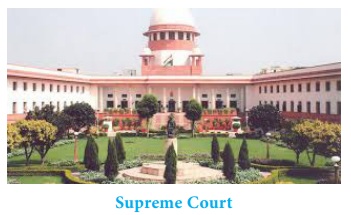Composition, Powers and Functions of the Supreme Court, Appointment, Qualification of Judges | Central Government of India - Judiciary | 10th Social Science : Civics : Chapter 2 : Central Government of India
Chapter: 10th Social Science : Civics : Chapter 2 : Central Government of India
Judiciary
Judiciary
Judiciary is the third organ of the government. It plays a vital role in protecting the rights and freedom of the citizens.
Supreme Court
The “Supreme Court is the Guardian of the Constitution”. Our judiciary is autonomous of the Legislative and Executive wing of the Union and State Government. An integrated judiciary means a single judicial hierarchy for the whole country. The judiciary plays an important role in defensive the rights and freedom of the citizens. It plays an important role in analyzing and interpreting the necessities of laws and the constitution

The Supreme Court of India, New Delhi was inaugurated on January 28, 1950. It succeeded the Federal Court of India, established under theGovernment of India Act of 1935.
Composition of the Supreme Court
At the commencement of the constitution in 1950 our supreme court consisted of 8 judges including the chief justice. At present, the Supreme Court consists of 34 judges including the chief justice.
Appointment of Judges
The Chief Justice of Supreme Court in India is appointed by the President of India. The other judges are appointed by the President in consultation with the collegiums with Chief Justice Head.
Qualification of Supreme Court Judges
• He must be a citizen of India.
• He should have worked as a Judge of a High Court for at least 5 years.
• He should have worked as an advocate of High Court for at least 10 years.
• He is in the opinion of the President, a distinguished Jurist.
The constitution also provides for the appointment of judges to the Supreme Court on an ad-hoc (temporary) basis. The Chief Justice and other judges of the Supreme Court hold the office up to the age of 65 years. The judges of the Supreme Court can resign before their term by giving their resignation in writing to the President. The Parliament also has power to remove the Judges by invoking impeachment provisions. The Supreme Court has its permanent seat in “New Delhi”. It may also sit any other place in India which may be decided by the Chief Justice of India with the approval of the President of India.
Powers and Functions of the Supreme Court
(a) Original Jurisdiction
The cases which are brought directly in the first instance to the Supreme Court come under original jurisdiction. These may be (i) dispute between the Government of India and one or more States of (ii) Dispute between two or more states (iii) The writs are issued by the Supreme Court for the enforcement of the fundamental rights.
(b) Appellate Jurisdiction
The Supreme Court is the final appellate court in the country. As regard the Appellate jurisdiction, the Supreme Court hears appeals against the decisions of High Court in “civil, criminal and Constitutional” cases with a certificate from the High Court that it is fit to appeal in the Supreme Court. Such a case can be brought before the Supreme Court only if the High Court certifies that the case invites a substantial of law as to the interpretation of the Constitution.
(c) Advisory Jurisdiction
The Constitution confers on the President the power to refer to the Supreme Court any question of law or fact which in his opinion is of public importance.
(d) Miscellaneous Jurisdiction
• The law declared by Supreme Court is binding on all courts within the territory of India.
• The Supreme Court is authorized to make rules for regulating, generally the practice and procedure of the court with the approval of the President.
(e) Judicial Review
The power of the judiciary to declare a law as unconstitutional is known as “Judicial Review”. The Supreme Court enjoys this power. The Supreme Court of India has Individual Review Power with regard to
• Dispute between the Centre and the States
• To interpret and clarify a provision of the constitution about which there are some doubts and differences of opinion.
• Protecting the fundamental rights,
• Those laws passed by the legislatures which are not in accordance with the Constitution.
Related Topics